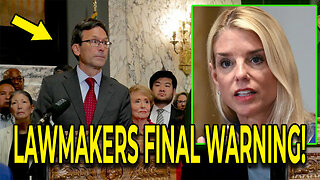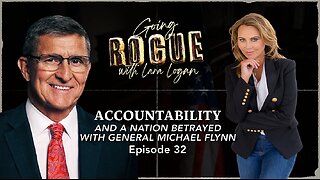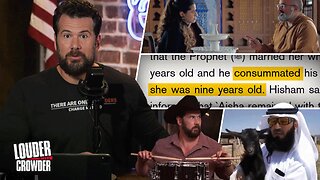Premium Only Content

DAC: The Illusion of Black and White A Social Construct in America
Welcome to Da Urban Conservative. Today, we’re diving deep into a topic that defines how we view ourselves and how society views us—what it means to be “Black” in America and why these terms—Black, White—are nothing more than social constructs. They’re words designed to divide us, to strip away the richness of our true identities. So, let’s break it down.
The question we need to ask is, “What is Black American?” Is it just skin color? Or is it something deeper, more complex? Historically, “Black” was a label forced upon people with dark skin, especially those from sub-Saharan Africa. But that’s not an identity; that’s a category—a box meant to contain us. What’s often forgotten is that before there was “Black,” there were distinct cultures, ethnicities, languages, and histories that traced back to kingdoms, tribes, and civilizations. But what did America do? America erased all that, lumped it together, and said, “You are Black.”
Think about the power in that, the deliberate erasure of identity. You see, Blackness in America has become a catch-all term that flattens our diversity. It’s as if we’re not allowed to be African, Nigerian, Ghanian, Somali, or Ethiopian. Instead, we become just Black. And that’s by design. It makes it easier to dehumanize and marginalize us when we are seen as a monolith, rather than a tapestry of histories, cultures, and contributions.
Now, why is this important? It’s important because if we don’t understand this, we buy into the narrative. A narrative that strips us of our roots, of our connection to history. And in doing so, it strips away our power. White supremacy is a construct. But let me tell you—so is “Black.” And so is “White.”
If you go back through history, you see something interesting. People weren’t always “White.” They were Italian, Irish, German, Scandinavian, and more. But in America, to maintain control, the ruling class needed a division, a line. And that line was color. Suddenly, you weren’t Italian or Irish; you were White. White was the thing you could be to escape marginalization. To rise in a system built on the backs of non-Whites. It’s that simple. “White” became synonymous with power, privilege, and access. But it’s a false identity too, one built to uphold a system designed to oppress.
We need to understand something: race is a lie. Ethnicity, however, is real. History, culture, and lineage are real. And what’s even more powerful? These real things can’t be erased, no matter how hard they try. Black American doesn’t mean you’re simply “Black.” It means you’re part of a diaspora that survived the greatest act of violence the world has ever seen—the transatlantic slave trade. It means you carry in your veins the strength of your ancestors, who built civilizations long before America existed. And it means you have a claim to cultures and histories that are rich, vibrant, and dynamic.
This is why the term “African American” became so significant. It tries to reclaim some of what was lost, to say, “We are more than Black.” But even that falls short because “Africa” is not a country. Africa is a continent, a massive one, home to 54 countries and thousands of ethnic groups. What’s been stripped from many of us is the specificity of our roots, the beauty of knowing exactly who we are and where we come from.
Let’s talk about culture. Black culture in America is powerful because it’s a fusion—a survival mechanism that became an identity. From jazz to hip-hop, from soul food to street fashion, we’ve created something out of nothing. We’ve created beauty from pain. But we also need to recognize that Black culture in America is a response to trauma. It’s what happens when you are disconnected from your motherland and forced to create something new. And what’s more powerful than that? But it’s also a reminder that we were meant to be more than a construct. We were supposed to be free to be Nigerian, Haitian, Jamaican, or Ghanaian, without being reduced to just “Black.”
But I want to flip this conversation on its head. Why is this social construct so necessary to those in power? What do they gain by keeping us locked in this racial binary? They gain control. They gain the ability to keep us fighting among ourselves, to keep us disconnected from each other’s struggles, to keep us from building alliances with others who’ve also been marginalized by this system.
When we talk about “Black” and “White,” we need to remember that it’s all part of a design—a design that benefits the few. And what’s the way out? We reclaim our ethnicities, our identities, our histories. We stop accepting these labels and start seeing each other for who we really are: people, with rich cultures and stories to tell.
I’m going to leave you with this: Being Black in America is a political identity, yes. But being African, being from the diaspora, that’s who we truly are. And until we start owning that, we’ll keep being defined by a system that was built to erase us.
This has been another episode of Da Urban Conservative. Stay tuned for more conversations that push the boundaries and dig deeper than the headlines. Until next time, be strong, be smart, and be free.
-
 8:53
8:53
Dr. Nick Zyrowski
3 months agoStarve Fat Cells, ( Not Yourself ) - Ultimate Fat Loss Guide
2.07K1 -
 20:29
20:29
T-SPLY
16 hours agoWashington Governor Under Risk Of Being Arrested!
49017 -
 2:07:34
2:07:34
Tim Pool
3 hours agoWill AI Destroy Humanity? Can Humans Escape AI Doomsday Debate | The Culture War With Tim Pool
73.8K35 -
 35:53
35:53
Lara Logan
10 hours agoACCOUNTABILITY AND A NATION BETRAYED | General Michael Flynn | Episode 32
6.31K6 -
 3:33
3:33
Michael Heaver
6 hours agoEngland Witnesses By-Election BOMBSHELL
4.7K2 -
 1:04:41
1:04:41
Steven Crowder
22 hours agoIslamic Love in America: Crowder Torches PBS's New Muslim Propaganda Documentary
219K164 -
 1:34:16
1:34:16
The Mel K Show
3 hours agoMORNINGS WITH MEL K - The Season Of Treason: America’s Future On the Ropes 8-22-25
21.4K6 -
 1:02:41
1:02:41
Flyover Conservatives
13 hours agoUpdate on Tina Peters in Prison - Matt Meck; The Big Shift You Must Make Before It’s Too Late - Clay Clark | FOC Show
23.3K1 -
 4:51:15
4:51:15
JuicyJohns
6 hours ago $0.33 earned🟢#1 REBIRTH PLAYER 10.2+ KD🟢
60.5K2 -
 32:24
32:24
Rethinking the Dollar
2 hours agoPowell Caves: The MAGA Wealth Effect Begins NOW! | Morning Check-In: Let's Talk...
17.8K3